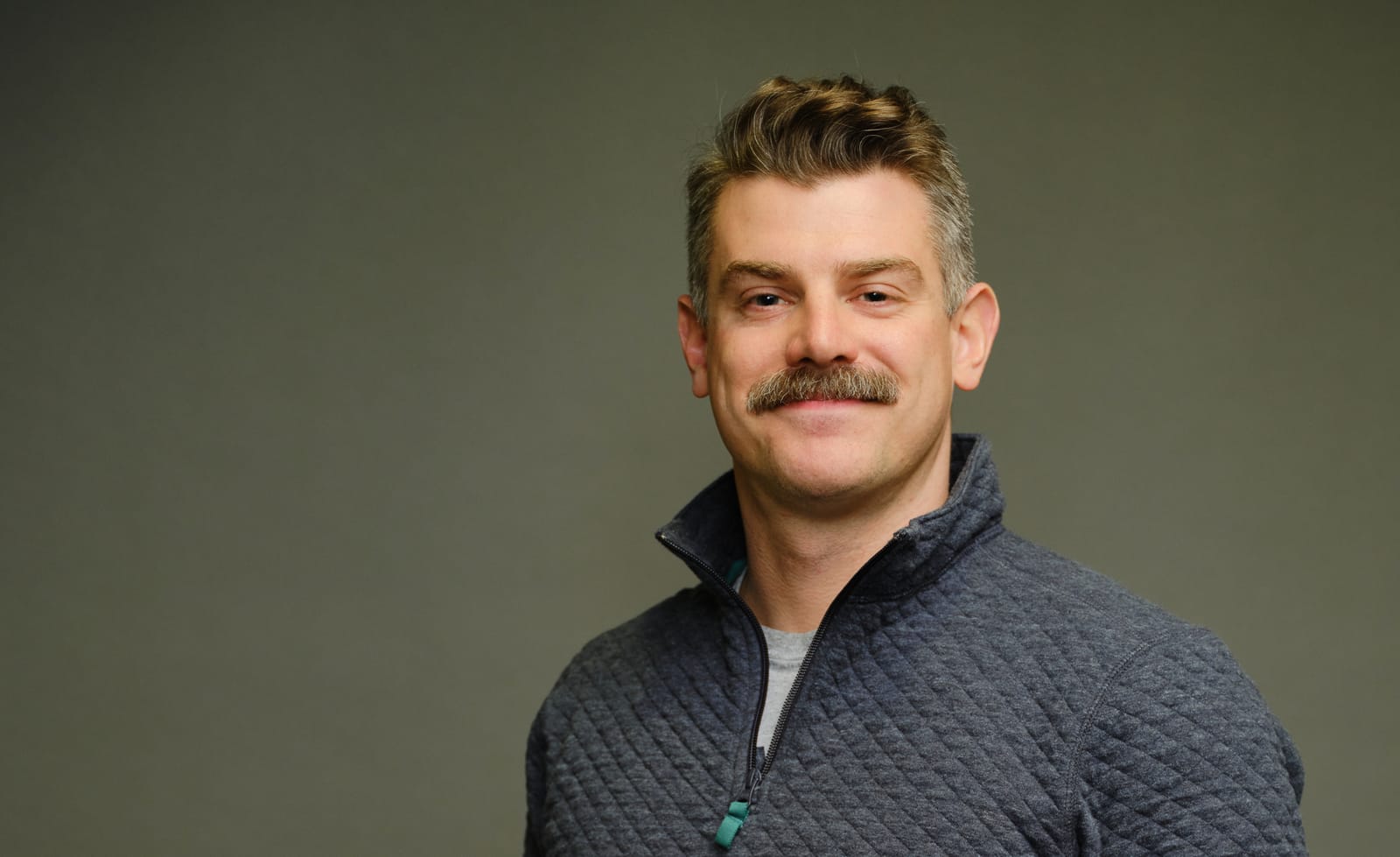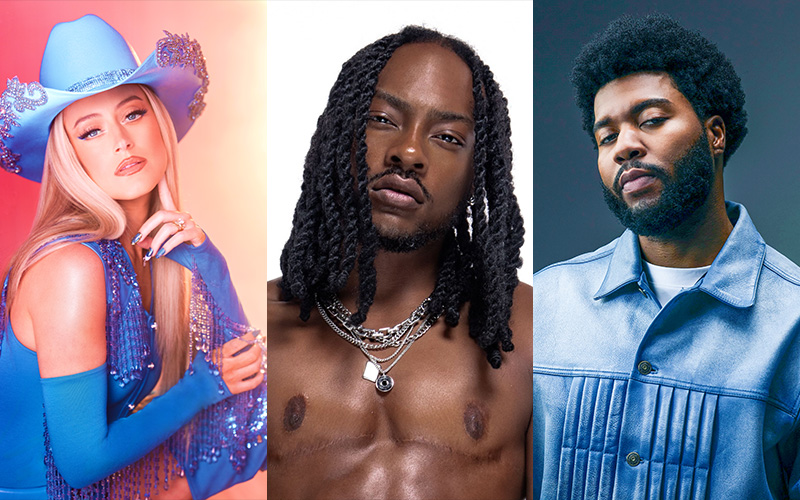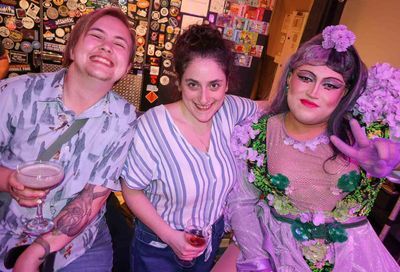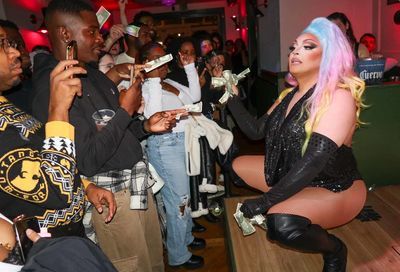John Cameron Mitchell on bringing back Hedwig, his new podcast Anthem, and his role on “Shrill”
Starting with Hedwig, John Cameron Mitchell has built a career out of being unconventional. And he's not about to stop now.

In the 20-plus years since John Cameron Mitchell and Stephen Trask’s Hedwig and the Angry Inch introduced us to the “internationally ignored” East German songstress Hedwig, the fictional rocker has become a revered, if flawed, cult symbol for queer folk and outsiders everywhere.
Off and on Broadway, and thanks to a well-received film adaptation directed by Mitchell, the character, far from being ignored, has enjoyed international success, with a growing list of well-known actors who have donned the wig and makeup to play the role. Mitchell, of course, originated the part, but he and Hedwig have never shared a stage quite the way they do now on his The Origin of Love Tour: The Songs and Stories of Hedwig, which inches Friday onto the National Theatre stage.
In the musical, Hedwig told her story, but in The Origin of Love, it’s her creator who bares his heart. “It’s not Hedwig talking,” says Mitchell of the cabaret-style performance. “It’s me talking about where Hedwig came from, where we are now. The people behind the story. How it came about. How it affected some people. How it affected me.”
Mitchell also performs Hedwig’s transcendent songs, like “The Origin of Love” and “Midnight Radio,” while dressed in what he calls “a kind of meta-Hedwig outfit” designed by artist and costume designer Erik Bergrin. “That’s really just the sugar to attract the flies. Then we talk about real stuff, and we have a good time. It’s a history of Hedwig, but it’s also a pep rally for the feelings that hopefully came out of Hedwig, which were unity of the outsiders standing together to make things better. Not just to defend, but to actually share some love and empathy that is sadly missing.”
Mitchell plans to keep spreading the love when The Origin of Love Tour hits New York City this summer, timed to celebrate 50 years of Pride. And he’ll keep sharing his message of empathy with another upcoming project, Anthem: Homunculus, a musical podcast he created, co-wrote and stars in, opposite fellow Tony-winners Cynthia Erivo and Glenn Close.
Mitchell, who has appeared on several television series, from Girls to The Good Fight, and will soon return to TV in the Aidy Bryant-starring Hulu comedy Shrill, originally wrote Anthem as a TV series. But the musical political satire was rejected by the powers-that-be in L.A., he ventures, for being too weird.
“So I’m like, ‘Well, I’ll make it as a podcast.’ Nothing is wasted. Nothing is regretted,” he says, sounding positively like an artist whose creative wheels never stop turning. “Sometimes I gotta make the money job, and then I do the love job. Sometimes the money job is the love job. Just as long as I’m doing the things I love. And you can find things to love even in your money jobs. There’s a way to do that if you’re not chasing money. If you’re chasing money, and only trying to make money, there’s gonna be much more unhappiness. You might be rich, or you might be whatever, but there’s a hollowness to it. There always has to be a bit of a balance.”

METRO WEEKLY: What’s the status of Anthem: Homunculus?
JOHN CAMERON MITCHELL: It’s coming out on a new podcast network called Luminary that aims to be the Netflix of podcasts. Meaning they’ll have all the free ones, and then they’ll have 40 of their original ones. And we are one of the first flagship original ones. It’s a six-hour fictional podcast that isn’t really my new musical. It’s about a lot of things. But is in the form of a crowdfunding telethon where a guy that I play has a brain tumor, no insurance, and is crowdfunding his treatment on an app. So he’s doing a telethon to raise money to get an operation to get his tumor out. He’s not famous, so he’s hoping to go viral for his cancer.
MW: Which, of course, doesn’t seem too far from something that might really happen.
MITCHELL: I know. Yes. Fucked up world.
MW: It would be fucked up if someone would need to do that to save their own life.
MITCHELL: Absolutely.

MW: But people stepping up to help them would be a good thing.
MITCHELL: It would. I mean, I hope it would also point to the priorities of our government, in the richest country in the world. I’m doing The Origin of Love Tour, partially, to raise money for my mom’s Alzheimer’s care. Again, we don’t seem to have much priority for our healthcare for old folks. She’s from Scotland, and her Scottish relatives are horrified that there isn’t help. So this is one of the reasons I’m doing the tour.
MW: I agree that healthcare seems a really low priority for this administration. In terms of actually making sure people have it, as opposed to just arguing about it.
MITCHELL: Yeah. Same with education, and a lot of things that are actually rights in other industrialized countries. We’re squabbling about our basic citizens’ needs, as opposed to providing them. We’re squabbling about walls and wars. It’s a strange situation we’ve been in for a long time.
MW: Well, for example, I just saw a video talking to some voters who basically kept coming back to, “That’s their problem.” As in, If you can’t afford healthcare, that’s your problem. So we have to change, I think, more than a policy.
MITCHELL: A lack of empathy.
MW: How do you feel Hedwig and this show addresses that lack of empathy? Because I feel like she’s the opposite of that. She’s somebody who feels, and transmits feelings.
MITCHELL: She’s also a deeply mutilated, damaged person forced into a gender reassignment by a kind of strange, binarchical political system, and a fucked up boyfriend. So there’s a strange situation of being at the bottom of a barrel, in some ways, trying to feel. The character is quite cool in the piece to her own partner/backup singer and band. There’s a strange vicious cycle happening of her having been abused, and, is this gonna be her life? Is she going to be a victim forever? And what’s happened to her through her boyfriend, and mother, and father raping him as a little boy. All of that stuff could very well create someone who’s obsessed with their victimhood. But through the music, through the rock ‘n roll, through the telling of the story, there is a catharsis that happens at the end. A beginning of a kind of wholeness. And when you think of yourself as a victim, one of the first things to go is empathy.
Digital culture, I think, can amplify that because you’re suddenly behind screens, and you’re even more alone. So you start screaming louder in the cyber world to be heard, and say, “I exist.” And that can often happen in a very negative way. And screaming usually is calling people out. It’s lashing out. It’s, “I’m, here!” You know? “Fuck you! I’m here!” Everyone’s become a dangerous shut-in in this country, it seems. And it amplifies problems that, perhaps, aren’t as large as they [seem]. I grew up in the ’70s. There was more terrorism, there was more economic malaise, there was more distrust in government. Even than now. There was division, but the way we heard about it was different. So we were, perhaps, less anxious. Perhaps less — there wasn’t the 24-hour news cycle. There was at least an agreement there might be some objective facts, which has gone away, too.
MW: And the relentlessness changes it, too.
MITCHELL: Right. It never stops. The ’70s was rough and paranoid, too, but there was a kind of cycle of breathing through it and going to the next thing. Now, you go from level 10 to 10 to 10. There’s no pause. Anxiety’s the result.
MW: Is the musical style of Anthem also rock ‘n roll?
MITCHELL: You know, it’s very mixed. Even more eclectic than Hedwig. Bryan Weller and I wrote the songs. I focus on lyrics and melody, while he’s the real musical genius. With Hedwig, it was all Stephen Trask writing the songs. In this case, we go from classical to folk rock to full-on R&B slow jam to, I don’t know, kind of crazy, waltzy circus music. There are 31 songs in this, and you cannot peg it. I grew up all over the world. The idea of collage and eclecticism is built into my history as an actor, and an Army kid, and a queer kid. Queer people are internationalists. Borders are strange to us. We go into another country, go to a queer bar, something, you find your kin. Race, national origin don’t make any difference. They just are spice to life. It’s not defining. Even as a kid in high school, I remember writing an article for the school paper saying, “Why does everyone have to define themselves by their kind of music? Why do the stoners always have to listen to Zeppelin? Why can’t they listen to Aretha?” Why do people have to separate themselves with the things that they consume? And I know it’s a tribal thing, and I wanna belong, and I feel safe. But it felt very limiting. So, to me, eclecticism is always part of my deal.

MW: I also feel we need to mention that Cynthia Erivo is involved. She’s pretty awesome. What is she doing?
MITCHELL: Well, Cynthia plays the mother of my character’s child. She and my character, and my character’s boyfriend, who’s played by a brilliant South African singer named Nakhane, who you have to check out. His album’s about to come out here. Madonna’s, in her vampiric way, grabbing him and holding him high right now. But he’s as eclectic as anybody. He’s a brilliant actor. He was in a film called The Wound, that was on the long list for Oscars last year. And he’s got a spectacular voice. Very openly queer in South Africa, which is unusual. A brilliant actor. So he, Cynthia, and I kind of create a little family in this piece. We try to have a child. She plays a revival preacher, who preaches the Gospel of the Virgin Mary. She hates Jesus. It’s all about the Virgin Mary. So we’ve written five songs for her. She’s spectacular. We just have incredible talent in this. Glenn Close sings a punk song as my mother nailed to a cross. Patti LuPone is a junkie nun, who sings an incredible jazz song. Denis O’Hare plays my dad beautifully. Marion Cotillard plays my doctor.
MW: Where did you get Marion Cotillard?
MITCHELL: I directed her in some commercials in the 2000s. We’ve become buddies. She’s a really good singer. She wanted to play Hedwig in Paris, but it didn’t work out.
MW: I had no idea that she sings.
MITCHELL: Yeah. Check her out. She’s really good.
MW: It seems that the character of Hedwig and that story speaks especially to young, queer audiences. Your body of work in films also speaks to young audiences. Do you make a point of staying engaged with younger generations of LGBTQ folks?
MITCHELL: Totally. Totally. I always wanna know what’s going on. I get annoyed because I don’t feel very mainstream. I never did, specifically, feel very mainstream gay. But I feel queer. My group has always been very mixed, gender and sexuality-wise. You know, you could be queer and be straight, it’s really an umbrella term that means you look at the world from an outside point of view, through a prism of knowing that there’s a flow to gender. Knowing that there’s a flow to sexuality. We all have our feminine, straight friends who, in effect, knew what it was like to be pushed outside, to an extent. To me, the Hedwig audiences have always been extremely mixed, and she’s often reintroduced to a new generation every few years.
There’s a show on Netflix called Sex Education that’s a big hit. And through the episodes, Hedwig figures into this high school dance very prominently. And it keeps having a different kind of resonance at different times because it’s a metaphor. It’s not a statement. It’s a metaphor that [people] can change. The song “Origin of Love” seems to be, “Oh, who’s my soulmate?” But then it becomes about your own union, your own wholeness. Whatever that means. Whether that means finding your own gender, finding your own sexuality. Whether it means finding your own happiness within, or through a connection with another person. The song “Midnight Radio” calls the misfits and losers to band together. And drag was one way to kind of armor yourself, but also, hopefully, connect yourself to other people going through similar situations. And it’s not a statement for any specific community. It’s a statement for understanding that those who’ve always been considered outsiders have a lot to teach the rest of us. It can certainly destroy you, too. But, to me, I feel my queerness actually was a great privilege that brought me so much happiness and joy, and introduced me to so many new kinds of communities, and the most wonderful people in my life. I would be very boring, and maybe more conservative, and, perhaps, more empathy-free if I hadn’t been queer.
You know, you can also take queerness and make it into a defense for “Fuck you! You’re not queer.” You can do that, too. I get bewildered when I meet queer people who are racists. I’m like, “What? How can you do that when you’ve been shit on, too? Are you really gonna turn around and find another scapegoat?” Or playing the oppression Olympics. “I’m more oppressed than you are.” It’s like, really, guys? Is this really the solution? To find the worst off and to say that’s more important. We’re all going through something. So that annoys me.
I do try to find out what’s going on that’s interesting. But I also have to limit the information overload that some of the people are now growing up with. Because a lot of young, talented, and smart people are overloaded, and not as productive because they look around and say, “Everything’s already been done before. Why should I even bother doing anything? And we’re all going to Hell anyway.” Must be very hard to be young right now. We, at least, had a lip service to “you can make the world a better place,” which I still believe. But when you’re young now, all the evidence seems to be like it’s downhill, which must be very scary.

MW: Well, also it seems that the world used to be just more pleasantly mysterious. Where now, people take such pride in demystifying everything, and knowing everything.
MITCHELL: Knowing everything. Yeah. If everything is available, and every song is playing at the same time, the idea of writing a new song feels futile and overwhelming. When David Lynch probably saw few very powerful films and made his Eraserhead in the dark, with not much information, and not much influence. And you’re just like, “I’m gonna go in there and see what happens.” There’s not a lot of that going on now because there’s no dark in the industrialized world. It’s sometimes just knowing a few things that helps something original happen. You know what I mean? So I always prescribe a digital diet of input to young people when talking about creating things. Do your research. Find out what has happened. Absorb things. Then turn them off, and follow a creative line. A line of imagination. Whether it’s making an invention, or telling a story, or building a house. Or having a child. Stop researching after a certain point.
It feels like everyone is in an incessant research mode. But you start to see the exhaustion with it when you’re like, “Hey, who was it who said that?” And we all have our phones, and no one wants to google. I can’t take it anymore. Let’s just pleasantly not know. And it’s in the not knowing that new things happen. Doesn’t mean you’re not informed about the history of, say, film, if you’re gonna make a film. But break the rules.
The other thing that has changed things for young people is, because it’s social media, there’s a sense of self-branding that starts very young, which is a great capitalist kind of thing. It’s like, “How am I gonna make more clicks, more money, position myself?” You’re 10. You’re positioning yourself? You’re 10. What are you doing? Are you preparing for your startup? It’s like, let youth happen. Let it not have to be remunerative right away. What happened to arts for art’s sake? Young people will say, “Well, you have the luxury of that.” I’m like, “We all have the luxury in our culture, if we’re living with our parents, to take some risks. And then when we’re not, to take some other risks.” We don’t have to be on a career track our whole life.
MW: On the subject of a different kind of parenting, since several other actors have performed Hedwig, do you consider your version the mother of the house of Hedwigs, and the others are drag daughters? What do you see when you watch someone else performing that part?
MITCHELL: I feel very proud. I feel very relieved that I don’t have to keep doing it. David Bowie didn’t have an understudy. You know what I mean? God bless him. I come from the theater, so the joy of knowing that someone else could play a part I originated, it’s so strong. Not the least of, someone would care enough to want to do it. But also, I can get royalties while other people do it. It’s a miracle. And a cabaret artist doesn’t necessarily get that. But this character is a fake rock singer, and a fake cabaret artist. I’m very happy to see other people reinterpret and play around with it. I don’t control it in any way. If they wanna have ten Hedwigs in a production, as they did in San Francisco last year, great. It’s a sturdy enough piece that you can interpret it in many ways. I don’t want them to necessarily cut vital lines, but feel free to add stuff. Make it site specific. That’s what I learned about rock ‘n roll, is that the script is loose, it’s living, it’s breathing. There’s some poetry that I want to remain the way it’s written. But keep it real, keep it in the space you’re doing it. To me, it’s the greatest compliment when other people want to do it.
MW: Speaking of these different roles and actors, you’re acting on the Hulu show Shrill with Aidy Bryant. Who do you play? It looks like a lot of fun.
MITCHELL: It is a lot of fun. It’s based on the Lindy West book Shrill. It’s an autobiography of being a journalist in Seattle. Being a big girl, and kind of getting fat-shamed, and finding her big girl voice. She’s kind of a fat activist, she calls herself. And just really funny, really humane. Aidy is one of the nicest people I’ve ever worked with, and the most talented. I play her mean, gay boss. Which I’ve played before, and I can play again. That show really helped me, because I was ready to go back to being a regular in a TV show, which I hadn’t done for about 20 years. And this came along, and they were like, “Do you really wanna do it?” I’m like, “Yes!” So it shot in Portland, which I love. And I could edit my podcast while I’m doing it because it was just one or two days a week in a beautiful town. So we’re praying it gets picked up because that also is helping Mom’s healthcare a lot. And it’s got a great cast. A lot of stand-up comedians. There’s a brilliant trans female comedian named Patti Harrison you should check out. She plays my assistant. She’s hysterical. We’re buddies. Julia Sweeney from Saturday Night Live. Daniel Stern. It’s just packed with talent, and really nice people. I’d totally be happy doing this show for a long time.
MW: What would you want people to know about caring for someone with Alzheimer’s? Something that gets overlooked.
MITCHELL: Well, people react very differently to it. And it’s really hard to predict, which is why it’s so heartbreaking. Both my dad and my mom had it and have it. They both, luckily, came to the sweet spot that can happen with Alzheimer’s, which is a kind of happy oblivion where they’re just very happy, and they’re in the moment. They’re in pure Zen. The past is pretty much gone, and the future’s not thought about. And there’s a kind of strange swami-like Zen that can happen where they’re just happy, and looking at things and seeing their beauty in the moment. My dad, who grew up in D.C., in [his] last month — he’s since passed away — once said, “Just come outside right now.” His memory was pretty gone, but he said, “Come out. Look at this.” My mom said, “What is it?” He goes, “Come out before I forget.” Then we went out and he showed us the full moon over the mountains in Colorado where he lived. And he said, “Will you look at that? It makes you think you can be good.” And my mom was like, “I’m going in. It’s cold.” And then I was like, “Thank you, Dad, for that.” He said, “For what?” He forgot about it right away. But there was this moment, and it’s that wisdom in it. This wisdom and beauty in Alzheimer’s that is unexpected. Amidst the torture of it, just also this incredible beauty. And it brought our family together.
The family was a little bit riven, as many families can be lately, by politics, and religion, and really irrelevant things to a family. So it just went away. And that was beautiful. Now my mom lives with a caregiver in her house. Which is a model that is expensive, but it’s much more humane than an institution. So she’s in a family environment with kids around, and she has her own floor. So it’s a kind of nursing home for one, in a way, with a family. Instead of the stupid assisted living, hospital environment. So that’s another thing that people are starting to do, is create more residences rather than facilities for memory care. You have to have the things around you, you know. And the faces, and the pictures, and the people. And music is very important. In fact, they find that songs remain in the memory much longer than many other things. So singing a song to her really brings her out, lightens her. Because, for whatever reason, music connects to many parts of the brain, so it can’t be erased so easily. Which is one of the reasons we’re doing The Origin of Love. It’s a very comforting thing to go to a concert with a bunch of people, and feeling some of the same things.
MW: Do you think that this tour will be your final bow singing the Hedwig songs, wearing the wig?
MITCHELL: I don’t think so. I expect to be doing a production of it at 75 in a wheelchair. I almost did on Broadway because I ripped my knee out onstage. One of my first jokes is, “You’re seeing the show with the original cast,” and I did have a cast on. But, no, I don’t think so. I like doing the show better than doing the play because I can say whatever I want at any time. It’s much looser. It’s more enjoyable than doing the play, which felt a little bit like an oh-God-here-we-go-again type of thing. But, you know, I wanna do it again. In London, maybe, in a few years for a couple months. That’s the best role in the world. Every actor who plays it says, “This uses everything I know. And after I play it, no other role frightens me.” It’s just so hard, and it draws on everything you can possibly do. So anyone I meet who’s played it, there’s a kind of kinship. Brotherhood, sisterhood, whatever. And I really believe all genders, all ages, all sexualities can play it. It’s now a mask. It’s a role. It’s not a person. It’s a metaphor, you can take on, take off. It’s drag, and anyone can do drag.
The Origin of Love: The Songs and Stories of Hedwig is Friday, February 8 at the National Theatre, 1321 Pennsylvania Ave. NW. Tickets are $54 to $79. Call 202-628-6161, or visit www.thenationaldc.org.
Support Metro Weekly’s Journalism
These are challenging times for news organizations. And yet it’s crucial we stay active and provide vital resources and information to both our local readers and the world. So won’t you please take a moment and consider supporting Metro Weekly with a membership? For as little as $5 a month, you can help ensure Metro Weekly magazine and MetroWeekly.com remain free, viable resources as we provide the best, most diverse, culturally-resonant LGBTQ coverage in both the D.C. region and around the world. Memberships come with exclusive perks and discounts, your own personal digital delivery of each week’s magazine (and an archive), access to our Member's Lounge when it launches this fall, and exclusive members-only items like Metro Weekly Membership Mugs and Tote Bags! Check out all our membership levels here and please join us today!


























You must be logged in to post a comment.